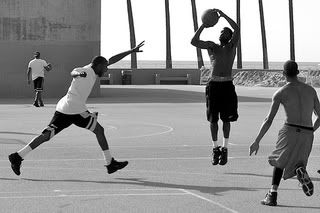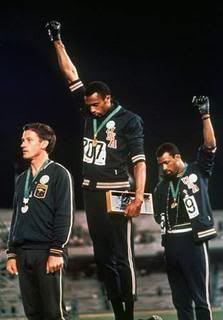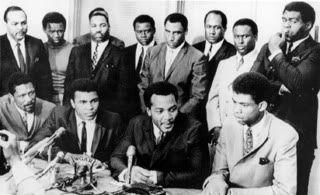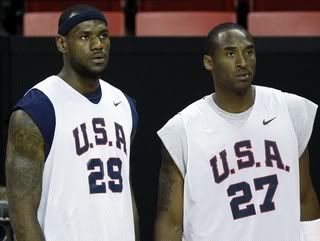
Forty years ago this month, the 1968 Olympic Games was defined by the political statement of two Black athletes. With Black fist raised high, and an ode to the Black Power movement displayed, Tommie Smith and John Carlos made one of the most profound political statements ever seen at an international sporting event.
The beauty and the significance of the statement was the weight and poignancy of its symbolism. Smith wore a black scarf around his neck to symbolize Black pride, and Carlos wore beads around his in recognition of the Blacks who lost their life on the Middle Passage. Both wore black socks but no shoes, to symbolize the pervasive poverty numerous Blacks faced. Each had on a black glove on the raised fists, emboldening the Black Power cry.
Smith and Carlos' act was not a "rebel without a cause" moment, but an attempt to raise awareness about the condition of those who materially have the least and work mightily to obtain more. They represented not just the Texas and Harlem neighborhoods their came from, but struggle of those in the African Diaspora. Class, race, and human rights all came together in sports.

Would Terrell Owens put up a fist for "Black Power" after he scores his next touchdown? Would Lebron James lead a voter registration drive in his home-state of Ohio? Is Floyd Mayweather going to comment on the need to restructure America's health care system?
When the Celtics visited the White House for their NBA Championship visit, did Ray Allen and Kevin Garnett talk to President Bush about his tax plan? Will Candice Parker and Lisa Leslie come out and endorse Cynthia Mckinney and Rosa Clemente for President?
And if they did, would Nike, Reebok, Adidas, and all their other sponsors take away their endorsement deals?
When Jim Brown criticized Michael Jordan, Kobe Bryant, and today's Black athletes a few days ago, he touched on an important issue---the role of the Black athlete in contemporary society, and their responsibility to themselves and the Black community.
Certainly it isn't a new discussion. But given the times, it seems all the more pertinent to think about.
The Black athlete in today's society is perhaps the most notable figure in the Black community. They are certainly among the wealthiest; and among young Blacks, perhaps the most influential. While it may not be a position they asked for, it is one they occupy none the less---no matter who thinks they shouldn't be, and no matter how much the athletes may say they don't want to be.
The question becomes what does their social position and privilege mean in today's society. Should we expect them to be more than athletes? Do they have a greater responsibility?
For the Black community, sports have always been about more than achievement. In fact one of sports main functions in Black life during the first half of the 20th century was disproving the idea of Blacks being biologically inferior. Contest on the field, in the ring, and on the court were challenges to White supremacy (biologically and ideologically). This is why the fights of Jack Johnson and Joe Louis, the races of Jesse Owens, and the success of Jackie Roberson are monumental events in American history. It is where not only did we see sports, but racial struggle played out.
For the Black community, sports was political. The 68' Olympics Black Power moment defines this.
But it was also economical.
Sports opened financial and entrepreneurial opportunities for Blacks. Successful athletes were able to open businesses in Black communities, and some members in those communities sought to use sports to create business enterprises (i.e. the Negro Leagues).
Many athletes felt a duty came with this success: a commitment to advocate for Black rights, a responsibility to stand against injustice and the violation of human rights, a mandate to use financial success and social recognition as a tool for community building.
You didn't just play a sport. You were compelled to have a moral stance, a social consciousness, and a political awareness. The lives and work of Black leaders like Paul Robeson, Jim Brown, Bill Russell, and Muhammad Ali are a testament to this.

Sports, race, politics, economics, morality, community---they were not separate, it all went together.
There is no question Black athletes like Serena Williams, Lebron James, or Carmelo Anthony know about the struggle of many Blacks in urban cities today. Being raised and growing up in areas like Compton, CA, Akron, OH, and Baltimore, MD make that reality unmistakable. Living in cities marked by racial segregation; plagued by the economic troubles of unemployment, gentrification, and de-industrialization; and haunted by racial inequalities embed this reality in them. They and many other Black athletes have lived the other side of the Civil Rights Movement's success: the continuance of racial segregation, unequal access to resources, and inequality in living conditions. The issues that Smith and Carlos attempted to raise are still issue today.
Many of these athletes have a Black consciousness, constructed by living through the success, hardship, pride, and complexity of race in America. And many of them understand the economic situation of those who have the least.
It is being young, Black, and successful in America, and the burden and challenges it brings that they struggle with. It is not financial obligation or charity that is difficult for them, it is the accountability of political advocacy and the fight for justice that is the burden.
"Do You," "Give Back," "Stand Up," or "Say Something," these are the choices and pressures our Black athletes face today. A pressure added to the fact that many have to grow up and mature in front of the whole world; making their missteps, mistakes, and learning experiences subject to the scrutiny of the public.
This all combines to create a tremendous tension over what is their role---to be role models for the Black community; to dedicate themselves to giving back to those who have less; and to use their global name recognition, ample resources, and media access to advocate for social justice and human rights issues; in short, to become more than sports heroes---to become role models, and community-orientated, politically involved leaders.

There's no doubt your parents, your teacher, or someone in the community should be young people's role models; these are the people they should look up to.
The problem is how many young Black kids grow up without parents, without teachers who care, and with adults who certainly are not role models.
The fact that so many Blacks have chosen to use sports as a healthy, legal way to provide for themselves and their families should be commended. But doesn't it show that their lives and their stories, the perseverance, dedication, and determination used to reach their level of achievement, their accomplishments, doesn't those things deserve to be so much more than example of how to succeed in a sport?
This is the point we should take from Jim Brown's comments. These young Black women and men lives are bigger than sports; it means more than money. Their lives are so much more meaningful than those things.
In life we all live together, not separate. We affect each other, and we can affect anything. Jim Brown's comments attempt to explain this. Tommie Smith's and John Carlos' statement reminds of this.
This is why we must ask Black athletes to do more---because our life is more than sports.
And until we develop ways to keep more parents involved in young people's lives; until we economically, spiritually, and emotionally empower those Black communities in the deepest struggle; and most importantly, until make sure that the parents, teachers, mentors, guidance counselors, educators, sanitation workers, rappers, nurses, case worker and everyone else who deserve to be role models are seen as such, we have to ask for our Black athletes to lead the way.
CREDIT WHERE CREDIT IS DUE:
The Carmelo Anthony Youth Development Center
(And I am sure there are more. Please feel free to mention them in the comments section)
THINGS TO READ, PEOPLE TO KNOW:
Paul Robeson
Roberto Clemente
Dr. Harry Edwards
Common Bond for Uncommon Men: Roberto Clemente and Martin Luther King Jr-David Zirin
Forty Million Dollar Slaves: The Rise, Fall, and Redemption of the Black Athlete-William C. Rhoden
Darwin's Athletes: How Sports Has Damaged Black America and Preserved the Myth of Race-John Hoberman
Michael Partis
michaelpartis@gmail.com
www.michaelpartis.blogspot.com
www.myspace.com/hiphopthought
http://my.rawkus.com/profile/ForeThought
